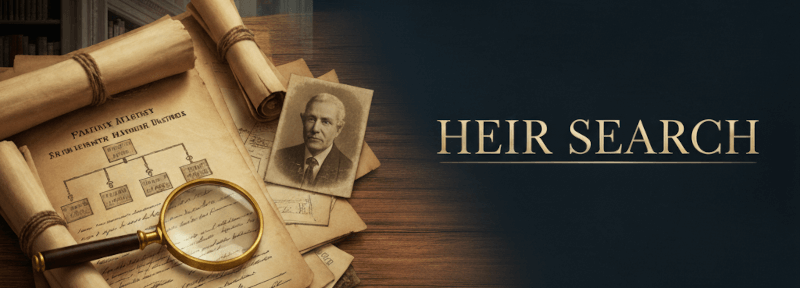Many people assume that an unexpected call or letter about “unclaimed inheritance” must be a scam. Sometimes it is. Often, it’s a legitimate outreach from a professional researcher asked to identify and contact heirs in a probate matter. This article explains how the heir search business works, the red flags to watch for, and what to do if you’re contacted.
Jump to Section
Summary
- Heir search is a legitimate service used by courts, attorneys, and executors to identify and document the legal heirs to an estate.
- Is the business of heir search a legitimate company? Yes, and this page describes why.
- Legitimate firms provide written agreements, explain fees, and can be verified. Scammers pressure you to pay up-front or share sensitive data.
- If contacted, verify the company, the case, and the court; never pay fees before you understand the agreement.
Overview
An heir search firm helps attorneys, personal representatives, and courts locate next of kin, document family lines, and produce the evidence needed to distribute an estate. This often includes building a family tree from vital records, resolving conflicting information, and preparing a report suitable for court. Some firms are retained directly by the estate; others work independently to locate possible heirs and may offer to assist them in asserting their rights.
If you’re comparing providers, start with their experience in probate and whether they deliver court-ready heir search services that include documentation and, when required, testimony.
Common Challenges
- Unexpected contact. A call or letter about an inheritance can feel suspicious; especially if you weren’t close to the decedent.
- Confusing fee structures. Some firms are paid by the estate; others use contingency or fixed-fee agreements with heirs.
- Privacy concerns. You may be asked for personal information to confirm identity for court filings.
- Cross-border records. Proof may span multiple states or countries, which affects how quickly documents can be obtained.
- Scams exist. Fraudsters mimic legitimate firms, rush you to pay, or ask for sensitive data before showing proof of a real case.
Legitimate Heir Search vs Scam Red Flags
Legitimate Heir Search vs Scam Red Flags
Step-by-Step Process: What to Do If You’re Contacted
- Request basics in writing. Ask for the firm’s full name, mailing address, website, and a contact person. Request the decedent’s name, approximate date of death, and the court handling the matter, if known.
- Verify the case exists. Call the probate court or speak with the personal representative/attorney to confirm there is an open estate and that outreach to heirs is expected.
- Review the agreement. Read the fee and services carefully. Legitimate firms will explain contingency or fixed fees and when you owe nothing.
- Protect your information. Do not send SSNs, full bank details, or pay any up-front fees to unknown parties. Share only what’s needed after you verify the case.
For general guidance on probate and avoiding fraud, see USA.gov: Wills and Probate and FTC: How to Avoid a Scam.
We can review it and tell you what’s legitimate, and what isn’t.
FAQs
Is heir search itself a scam?
No. It’s a legitimate service used to identify legal heirs and document their relationship to the decedent for court. Scams do exist, which is why verification matters.
Why would a company contact me instead of the court?
Researchers may be retained by the estate’s attorney or may work independently to locate potential heirs using public records and legal notices. Either way, the facts should be verifiable with the court.
Do I have to pay anything?
It depends on the arrangement. Some firms are paid by the estate; others use contingency or fixed-fee agreements with heirs. Legitimate firms provide written terms. Be cautious about up-front payment demands.
At some stage, you may need to prove identity for court filings. Do so only after you’ve verified the firm and the case and you have a written agreement.
How long does this take?
Timelines vary based on records, jurisdictions, and court schedules. Clear communication and document access will speed things up.
Expert Tips
- Ask for references or case examples. A reputable firm will have experience with court-admissible reporting.
- Keep copies of everything. Letters, emails, and agreements may be needed for the court record.
- Loop in your own attorney. Independent legal advice can clarify your rights before you sign.
- Don’t rush. Real inheritances don’t expire overnight; pressure tactics are a warning sign.
Related Resources
Not sure about a message you received? We’ll evaluate it, verify the court case, and outline next steps.
Book a Free Consultation Schedule a Call



